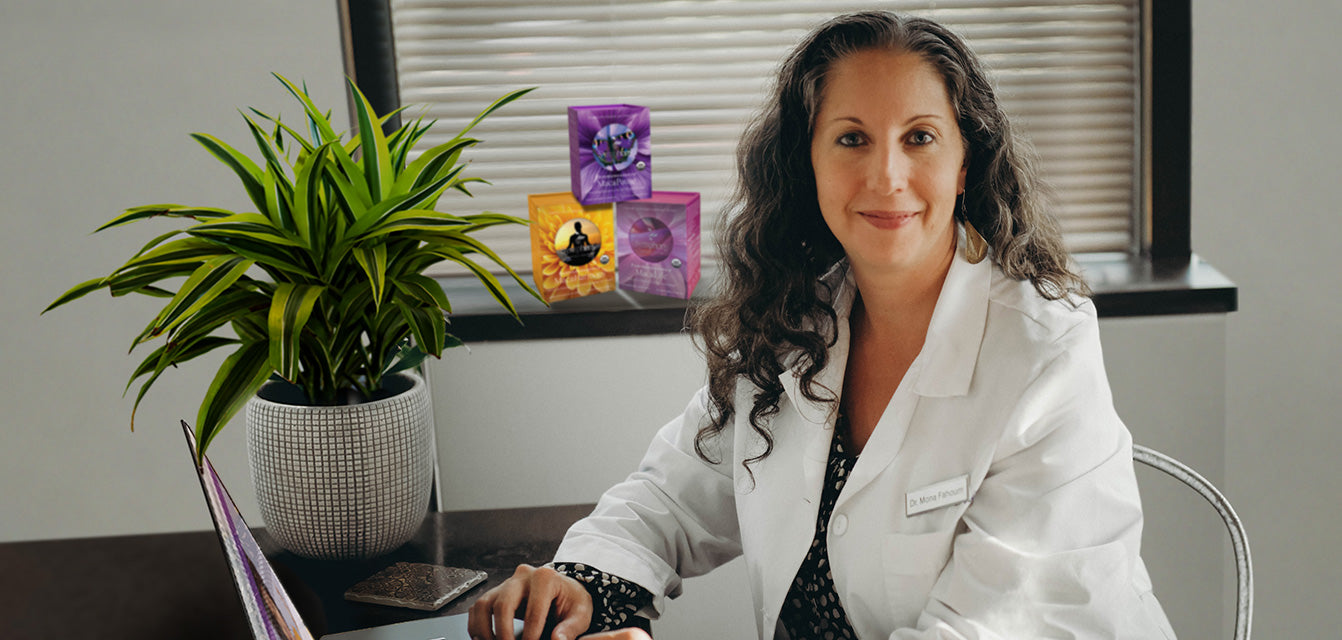By Mona Fahoum, ND
Reviewed by Tori Hudson, ND
September 22, 2023
Polycystic Ovarian Syndrome (PCOS) affects approximately 5 million women in the US, and world-wide it is estimated that 1 in 15 women are affected. Some of the symptoms of PCOS are infrequent or cessation of menstrual cycles, increased facial or body hair growth, scalp hair loss/thinning, and unexplained weight gain or impaired weight loss. Hormonal acne is also often a symptom of PCOS but you do have choices you have to help you manage your complexion and get your confidence back.
What’s going on?
Your HPTAO-axis (Hypothalamus-Pituitary-Thyroid-Adrenal-Ovarian) is command central for hormone production, including estrogen, progesterone, and androgens (testosterone, 5-dihydrotestosterone (DHT), dehydroepiandrosterone (DHEA), and androstenedione (A4).
It is normal for women to produce some androgens, because you need them for mood, libido, and bone health. In fact, all your hormones work together like a finely tuned orchestra to produce harmony and health. But when your hormones, especially your insulin levels, are out of balance, one of the obvious and upsetting symptoms is acne.
Insulin resistance is one of the root physiological imbalances in most, if not all, PCOS. This is where your pancreas needs to pump out more and more insulin in response to high blood sugar levels. But, higher than normal levels of insulin and Insulin-like Growth Factor (IGF) increase your production of androgens while simultaneously inhibiting your liver’s ability to produce sex hormone-binding globulin (SHBG).
SHBG binds tightly to estrogen, dihydrotestosterone (DHT), and testosterone and carries these three hormones throughout your blood. The critical hormone in the trio is testosterone, and SHBG controls the amount of testosterone your body tissues can use. Low levels of SHBG allow too much testosterone to enter your cells.
The rise in testosterone/androgen levels triggers your body to makes excess sebum, an oil that stops your skin from drying out, and this clumps together with dead skin cells that clog up your pores. When a bacteria known as Propionibacterium acnes (P. acnes), becomes involved, it triggers an inflammatory response from your immune system. All of a sudden, you’ve got pimples that are red, swollen, and sensitive to the touch.
What can you do?
Over-the-counter treatments like benzoyl peroxide and salicylic acid do not address your hormone imbalance and will most likely not work for acne resulting from PCOS.
Pharmacological Options
Ortho Tri-Cyclen
Doctors often prescribe the birth control pill as a way to provide some hormonal balance, but there are potential health issues associated with it that are a concern. And, only one pill is approved by the Food and Drug Administration for treating acne – Norgestimate/ethinyl estradiol (Ortho Tri-Cyclen). Ortho Tri-Cyclen uses a synthetic hormone called norgestimate that doesn’t encourage the release of acne-causing androgens.
Ortho-Cept
Desogestrel/ethinyl estradiol (Ortho-Cept) is not approved for acne. This oral contraceptive contains a low-androgenic progestin, desogestrel, that may clear up breakouts.
Spironolactone (Aldactone)
Aldactone is an androgen-suppressing drug used as a prescription medication on its own, and a few birth control pills have a progestin that is a spironolactone type drug (Yasmin and Yaz). It’s most commonly used to treat high blood pressure and heart failure, and is a diuretic. Aldactone does suppress the production of aldosterone (androgens), but potential side effects include drowsiness, dizziness, stomach upset, diarrhea, nausea, vomiting, and headache.
Holistic Natural Medicine Options
According to Tori Hudson, N.D., in the book, The Hormone Connection, a more holistic approach that includes natural remedies often works (but may take longer for results). Dr. Hudson recommends:
- Remove dairy and gluten from your diet
- Vitamin A (moderates skin cell turnover and production of sebum. Please work closely with your doctor or naturopathic physician)
- Zinc (30 to 45 milligrams daily, but check with your doctor before exceeding 30 milligrams)
- Vitamin E (400 IU)
- Selenium (up to 200 micrograms from diet and supplements combined)
- Vitamin B6 (100 milligrams daily)
- Saw palmetto (160 milligrams twice daily of standardized saw palmetto extract with 85 to 95% fatty acids. Recommended for prostate gland health, this herb checks your production of the enzyme that converts testosterone into sebum-stimulating DHT)
- Tea tree oil (a natural antiseptic)
- Support your body’s own hormone balance through the HPTAO axis
Choosing a supplement that supports the balanced production of hormones rather than introducing hormones to the body can be considered. Hormone balancing begins at the brain in the hypothalamus, cascading down through the pituitary, thyroid, adrenal glands, and eventually the ovaries. This signaling then circles back to the hypothalamus, creating a continuous feedback loop for ongoing communication between those organs. This process is referred to as the hypothalamus-pituitary-thyroid-adrenal-ovarian (HPTAO) axis. Depending on your needs, this may result in an increase or decrease in hormone production. However, many factors can cause this communication system not to work as efficiently as it should and therefore, additional support for the HPTAO axis can provide health benefits.
Overall, support of the HPTAO axis is essential. Clinical research on specific phenotype combinations (or colors) of Lepidium peruvianum, commonly known as maca, supports the body’s HPTAO axis. Rather than introducing exogenous hormones into the body to manipulate hormone levels, specific maca phenotypes nourish the endocrine system, supporting the body’s hormone production. However, not just any maca will do. First, research has shown that there are up to 17 colors of maca that have varying DNA and ingredient profiles and, most importantly, can have different physiological effects on the body, meaning some are more beneficial for men than women and vice versa. For example, some maca colors can increase androgen activity, potentially making PCOS and its symptoms worse. One case report showed increased testosterone levels in a woman after taking generic maca supplements. Second, in addition to needing to use specific phenotypes (colors) of maca, the concentration and bioavailability of the ingredient were critical in order to elicit a statistically significant improvement in multiple hormones. Third, even the location where the maca grows, as well as farming, drying, and manufacturing methods impacts the benefits it can provide. Therefore, choosing the right maca is especially important for women with PCOS.
Our team of doctors at Symphony Natural Health specialize in women’s hormone health and PCOS and are able to answer questions and have created a PCOS Guide you can find here.
References:
- Mehta-Ambalal S. Clinical, Biochemical, and Hormonal Associations in Female Patients with Acne: A Study and Literature Review. The Journal of Clinical and Aesthetic Dermatology. 2017;10(10):18-24.
- Marshall JC, Dunaif A. All Women With PCOS Should Be Treated For Insulin Resistance. Fertility and Sterility. 2012;97(1):18-22. doi:10.1016/j.fertnstert.2011.11.036.
- [Correlations between acne and polycystic ovary. A study of 60 cases]. Iurassich S, Trotta C, Palagiano A, Pace L. Minerva Ginecol. 2001 Apr;53(2):107-11. Italian.
- Emiroğlu N, Cengiz FP, Kemeriz F. Insulin resistance in severe acne vulgaris. Advances in Dermatology and Allergology/Postȩpy Dermatologii i Alergologii. 2015;32(4):281-285. doi:10.5114/pdia.2015.53047.


